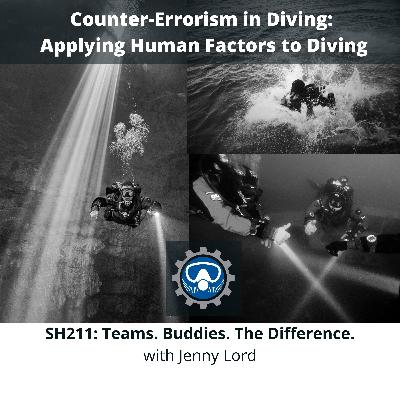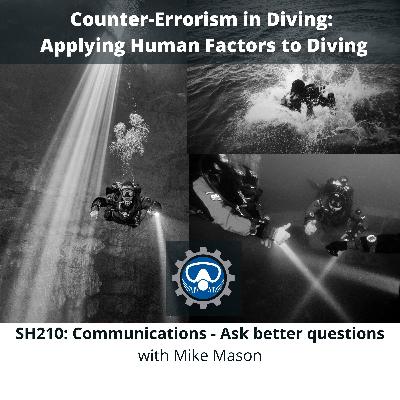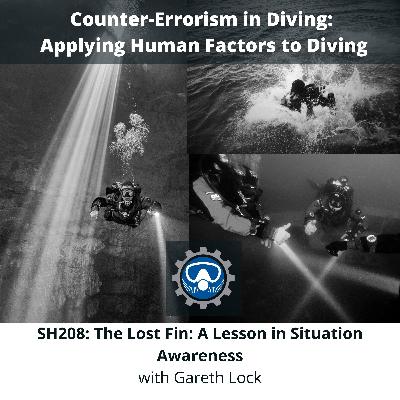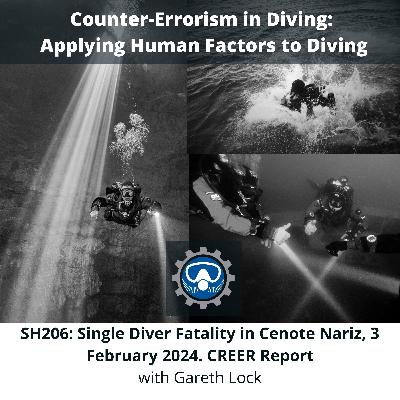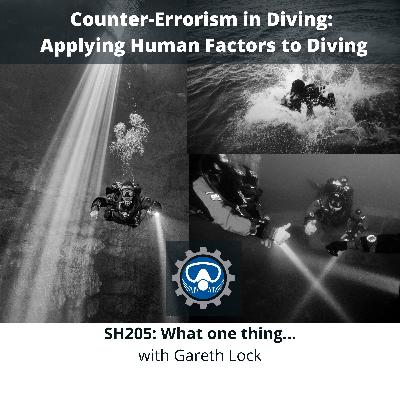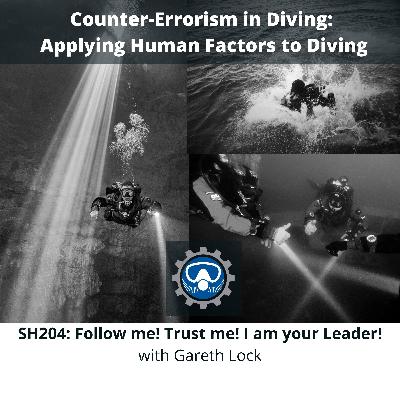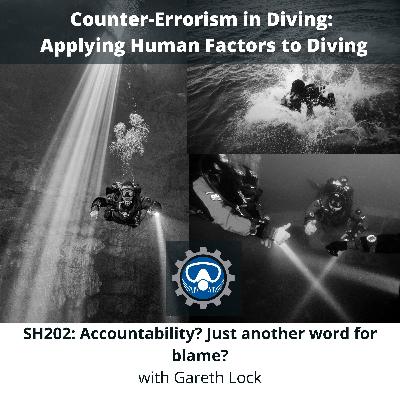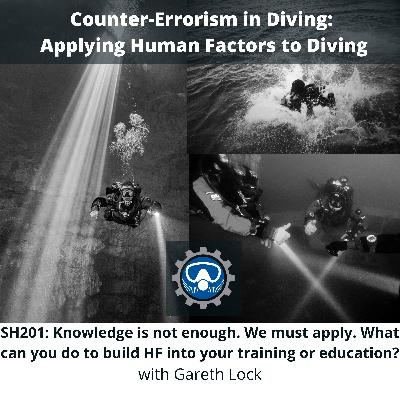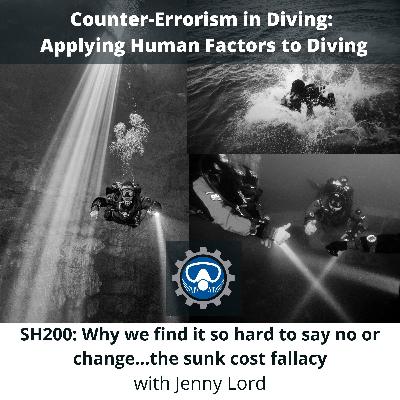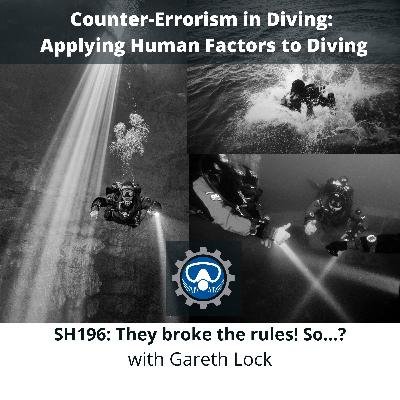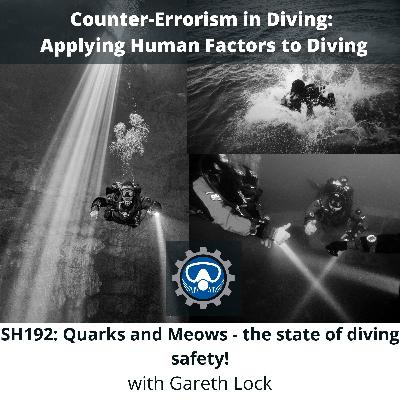Discover Counter-Errorism in Diving: Applying Human Factors to Diving
Counter-Errorism in Diving: Applying Human Factors to Diving

Counter-Errorism in Diving: Applying Human Factors to Diving
Author: Gareth Lock at The Human Diver
Subscribed: 6Played: 357Subscribe
Share
© 2025 (c) The Human Diver 2023
Description
Human factors is a critical topic within the world of SCUBA diving, scientific diving, military diving, and commercial diving. This podcast is a mixture of interviews and 'shorts' which are audio versions of the weekly blog from The Human Diver.
Each month we will look to have at least one interview and one case study discussion where we look at an event in detail and how human factors and non-technical skills contributed (or prevented) it from happening in the manner it did.
212 Episodes
Reverse
In this episode, we dive into what makes an effective team, both above and below the surface. Using insights from a dive centre in Egypt, we explore how teamwork goes beyond buddy pairs, emphasizing shared goals, mutual accountability, and trust. We discuss why planning, adaptability, and understanding each other's roles are key to working interdependently, especially in dynamic environments like diving. Whether you're guiding, learning, or just enjoying the dive, every diver is part of the team. Join us as we reflect on how small changes can strengthen teamwork and improve safety and enjoyment for everyone. How does your team measure up?
Original blog: https://www.thehumandiver.com/blog/teams-buddies-the-difference
Tags: English, Jenny Lord, Team, Teamwork, Trust
In this episode, we explore how asking the right questions can transform communication, whether during a dive briefing or a post-dive debrief. We discuss the difference between closed questions, which provide quick answers, and open questions, which encourage deeper understanding and learning. Using techniques like TEDS (Tell, Explain, Describe, Show), we can foster better communication, ensure alignment within the team, and create an environment where everyone feels safe to speak up. We also cover how to frame debrief questions to focus on events rather than individuals, encouraging growth and collaboration. Effective communication is all about how you ask, not just what you ask.
Original blog: https://www.thehumandiver.com/blog/communications-ask-better-questions
Tags: English, Brief, Communication, Communications, Debrief, Mike Mason
In this episode, we explore how cognitive biases like hindsight bias, severity bias, outcome bias, and confirmation bias impact our ability to learn from accidents and incidents, both in diving and beyond. Using recent Red Sea liveaboard tragedies as a backdrop, we discuss why some events seem “obvious” only in hindsight, how severe outcomes lead to harsher judgments, and the danger of stopping investigations once a single cause is found. By understanding how biases shape our reactions, we can shift from judgment to learning, asking better questions and uncovering the deeper factors behind decisions and actions.
Original blog: https://www.thehumandiver.com/blog/we-are-all-biased
Links: BBC articles: https://www.bbc.com/news/articles/cp3z0k72yw3o
https://www.bbc.com/news/articles/c87dxx41lvvo
Sea story sinking news report (in German): https://taucher.net/diveinside-safariboot_sea_story_im_roten_meer_gesunken-kaz9391
List of Red Sea dive boat sinkings: https://matthiasmunz.de/Sunken_Diving_Safari_Boats_Egypt/
Tags: English, Cognitive Biases, Decision Making, Decision-Making, Gareth Lock, Hindsight Bias, Jenny Lord
In this episode, we dive into the story of a diver’s lost fin to explore the challenges of decision-making, task fixation, and situation awareness underwater. Through the lens of a training dive gone awry, we uncover how both students and instructors can fall into cognitive traps, focusing narrowly on immediate tasks while losing sight of broader risks. Highlighting the importance of structured debriefing, reflective discussions, and the DEBrIEF model, we discuss how understanding "how it made sense" in the moment can lead to better mental models and a culture of learning in diving. This tale is a reminder that diving isn’t just about technical skills—it’s about building awareness, fostering teamwork, and learning from every experience.
Original blog: https://www.thehumandiver.com/blog/the-lost-fin-a-lesson-in-situation-awarness
Tags: English, Andrzej Górnicki, Debrief, Decision-Making, Hindsight Bias, Situation Awareness
This podcast dives into the analysis of a cave diving fatality at Cenote Nariz in Mexico, based on a detailed report by the Creer Line and Safety Committee. The incident highlights critical lessons for divers in all environments, emphasizing the importance of understanding human factors, decision-making, and context in adverse events. While the exact cause of the diver's seizure remains uncertain, likely contributors include hypercapnia or hyperoxia, exacerbated by equipment and procedural factors. Broader lessons focus on fostering safety cultures, avoiding the normalization of risk, maintaining equipment rigor, and embracing systems that encourage learning without blame. Join us to explore how these insights can improve safety and awareness across diving disciplines.
Original blog: https://www.thehumandiver.com/blog/change-your-language-change-the-world
Links: Podcast ‘Hidden Brain’- are our memories real?: https://hiddenbrain.org/podcast/are-your-memories-real/
Blog about Agency: https://indepthmag.com/the-role-of-agency-when-discussing-diving-incidents-an-adverse-event-occurs-an-instructor-makes-a-mistake/
Learning Reviews: https://www.thehumandiver.com/blog/learning-reviews-in-diving
Podcast ‘How did it make sense’: https://www.humaninthesystem.co.uk/hits-hdims
How language changes the way we think TED talk: https://www.youtube.com/watch?v=RKK7wGAYP6k
The Power and Pitfalls of Language in Accident Investigation: https://nescacademy.nasa.gov/video/2c1ea826930946ff8659621ee83bec931d
The Power Of Language: https://mindsetleadership.co.uk/2023/09/01/the-power-of-language/
Tags: English, Cognitive Biases, Communication, Gareth Lock, Incident Analysis, Incident Reporting
This podcast dives into the analysis of a cave diving fatality at Cenote Nariz in Mexico, based on a detailed report by the CREER Line and Safety Committee. The incident highlights critical lessons for divers in all environments, emphasizing the importance of understanding human factors, decision-making, and context in adverse events. While the exact cause of the diver's seizure remains uncertain, likely contributors include hypercapnia or hyperoxia, exacerbated by equipment and procedural factors. Broader lessons focus on fostering safety cultures, avoiding the normalization of risk, maintaining equipment rigor, and embracing systems that encourage learning without blame. Join us to explore how these insights can improve safety and awareness across diving disciplines.
Original blog: https://www.thehumandiver.com/blog/mx-singlefatality-report
Links: CREER: https://creer-mx.com/
Accident report: https://creer-mx.com/wp-content/uploads/2024/04/Single-Diver-Fatality-in-Cenote-Nariz-on-3-February-2024.pdf
A Just Culture is not a 'just do it' culture: https://www.thehumandiver.com/blog/a-just-culture-is-not-a-just-do-it-culture
Counterfactuals: I would have lined in: https://www.thehumandiver.com/blog/counterfactuals Why is it so hard to admit our mistakes?: https://www.thehumandiver.com/blog/why-is-it-so-hard-to-admit-to-our-mistakes
Tags: English, Cave Diving, Gareth Lock, Incident Analysis, Just Culture
This episode explores the power of small, intentional changes to improve teamwork, leadership, and performance in diving. Drawing from the Human Diver team's experience with a new training platform, we discuss how focusing on key skills like communication, task prioritization, and role clarity can create significant improvements. By embracing curiosity, running effective debriefs, sharing stories, and taking actionable steps, we can build safer, more effective diving practices. Change starts with small actions, and owning that change is the key to lasting impact.
Original blog: https://www.thehumandiver.com/blog/what-one-thing
Links: Marginal gains: https://jamesclear.com/marginal-gains
DEBrIEF guide: https://www.thehumandiver.com/debrief
If Only… documentary: https://www.thehumandiver.com/ifonly
The Human Diver blogs: https://www.thehumandiver.com/blog
Contact Gareth: https://www.thehumandiver.com/contact
The Essentials class: https://www.thehumandiver.com/HFiD-Essentials
Level 1 Webinar: https://www.thehumandiver.com/hfid-level-1-webinar-series
Face-to-Face program: https://www.thehumandiver.com/hfid-level-2
2 relevant blogs: https://www.thehumandiver.com/blog/knowledge-is-not-enough-we-must-apply
https://www.thehumandiver.com/blog/the-power-of-one
Tags: English, Debrief, Decision-Making, Gareth Lock, If Only, Just Culture, Leadership
Leadership in diving is critical for navigating uncertain situations and achieving successful outcomes, whether you're teaching students, leading a dive project, or running a dive center. Drawing lessons from Ernest Shackleton's legendary leadership and modern theories of influence, this episode explores how effective leaders go beyond authority and management to inspire trust, foster psychological safety, and build personal connections. We discuss six key strategies for diving instructors, including defining a clear purpose, embracing humility, managing conflict constructively, learning from mistakes, adapting leadership styles, and showing genuine care for others. Tune in for actionable insights to enhance your leadership in the water and beyond.
Original blog: https://www.thehumandiver.com/blog/follow-me-trust-me-i-am-your-leader
Links: Building psychological safety in a team (part 1): https://www.thehumandiver.com/blog/team-building-psych-safety-1
Trust is based on 1:1 relationships: https://www.forbes.com/sites/shanesnow/2020/04/27/this-common-approach-to-earning-trust-completely-backfires-on-leaders/?sh=515264702fcb
Goodheart’s law: https://humanisticsystems.com/2019/10/24/shorrocks-law-of-limits/
Double-loop learning: https://en.wikipedia.org/wiki/Double-loop_learning
The Ladder of Inference: https://thesystemsthinker.com/the-ladder-of-inference/
Self Discovery techniques: https://spectrumofteachingstyles.org/index.php?id=21
The Myth of the Advert: https://www.smithsonianmag.com/smart-news/shackleton-probably-never-took-out-an-ad-seeking-men-for-a-hazardous-journey-5552379/
Tags: English, Communication, Gareth Lock, Leadership, Psychological Safety, Teamwork
Debriefs are vital for learning and improvement, but making them effective can be challenging. This episode explores how the DEBrIEF framework, inspired by aviation and human factors experts, provides a structured approach to debriefing that fosters psychological safety. We discuss the importance of vulnerability, showing that even experienced divers make mistakes, and how leading by example encourages honest self-reflection. Real-world examples highlight how debriefs can move beyond surface-level feedback, helping teams identify areas for growth and create meaningful solutions. With the right structure and environment, debriefs can become powerful tools for continuous improvement in diving and beyond.
Original blog: https://www.thehumandiver.com/blog/the-importance-of-psychological-safety-in-debriefs
Links: The DEBrIEF model: https://www.thehumandiver.com/debrief
Jenny and Mike’s Briefing and Debriefing presentation: https://www.youtube.com/watch?v=JTM_Lh7HtmA&t=591s
Tags: English, Communication, Debrief, Gareth Lock, Psychological Safety, Teamwork
In this episode, we explore the meaning of accountability and its role in learning and improvement. Is accountability about assigning blame, or can it be a tool for growth? We discuss the difference between backward-looking accountability, which focuses on punishment, and forward-looking accountability, which emphasizes understanding, empathy, and systemic change. Drawing on lessons from healthcare and diving, we highlight the importance of hearing multiple perspectives, addressing the needs of those impacted, and fostering a culture of responsibility over blame. By sharing real-world examples, we show how open conversations and a Just Culture approach can lead to better outcomes, stronger relationships, and meaningful improvements in safety and performance.
Original blog: https://www.thehumandiver.com/blog/accountability-or-another-word-for-blame
Links: Two approaches to accountability: https://link.springer.com/chapter/10.1007/978-94-007-1878-4_3
Accountability and Responsibility defined: https://www.researchgate.net/publication/324582377_Accountability_and_responsibility_defined
Helping people understand what happened: https://www.aamc.org/news-insights/best-response-medical-errors-transparency
Communications and Resolutions Programmes: https://communicationandresolution.org/communication-and-resolution-programs/
‘Work as Imagined’ and “Work as Done’: https://www.youtube.com/watch?v=vtgIwHrUWVQ&list=PLNXuyLsCTX6hHS3newpcROfJ_JiI27q3C&index=24&t=1s
Restorative Just Culture in The Merseyside NHS Trust: https://www.researchgate.net/publication/331284479_Restorative_Just_Culture_a_Study_of_the_Practical_and_Economic_Effects_of_Implementing_Restorative_Justice_in_an_NHS_Trust
Restorative Just Culture: http://www.safetydifferently.com/wp-content/uploads/2018/12/RestorativeJustCultureChecklist-1.pdf
Second and Thrid victims: https://youtu.be/YeSvCEpg6ew
Tags: English, Gareth Lock, Incidents, Just Culture
In this episode, we dive into how to integrate human factors and non-technical skills into dive training and businesses. We explore the importance of understanding and applying these concepts in real-world scenarios, from effective communication to structured debriefing. Discover practical tools like blogs, workshops, and the Essentials of Human Factors in Diving course to deepen your knowledge and improve safety. Learn how abstraction, open questions, and storytelling can enhance learning and problem-solving in diving. Tune in to hear actionable advice on making human factors a core part of your diving practice.
Original blog: https://www.thehumandiver.com/blog/knowledge-is-not-enough-we-must-apply
Links: Human Factors in Diving Conference videos: https://www.youtube.com/playlist?list=PLNXuyLsCTX6hHS3newpcROfJ_JiI27q3C
Blog page: https://www.thehumandiver.com/blog
Dummies series: https://www.thehumandiver.com/blog?tag=dummies
DeBRIEF guide: https://www.thehumandiver.com/debrief
If Only…documentary: https://www.thehumandiver.com/ifonly
Gareth’s contact for Mandated Essentials class, or Affiliate link: https://www.thehumandiver.com/contact
Tags: English, Gareth Lock
In this episode, we explore why calling a dive can be so difficult and why safety ultimately allows us to dive more. We discuss how small issues and stressors, combined with the sunk cost fallacy, can lead divers to push boundaries they wouldn’t normally cross. Drawing on personal experiences, we highlight the challenges of making safety-focused decisions and why they’re essential for long-term enjoyment of the sport. Safety may seem like a small loss in the moment, but it guarantees the chance for many more dives in the future. Listen in to learn how to balance risk and reward to keep diving safe and fun.
Original blog: https://www.thehumandiver.com/blog/sunk-costs
Links: Guaranteed small loss vs possibly big loss blog: https://www.thehumandiver.com/blog/the-choices-guaranteed-small-loss-or-a-probable-large-loss-injury-or-fatality
Tags: English, Cognitive Biases, Decision-Making, Jenny Lord
Why is safety often seen as boring in diving? In this episode, we discuss a story of high-current dives, questionable guiding practices, and the stigma of prioritizing safety over thrill. While safety briefings and precautions might seem dull or restrictive, they’re the key to longevity in diving—and life. A safe diver isn’t boring; they’re the one who gets to dive again tomorrow. We explore the value of being the “boring” diver, how safety builds trust among dive buddies, and why prioritizing safety ensures more adventures in the long run. Don’t let “fun” override your commitment to coming home safe.
Original blog: https://www.thehumandiver.com/blog/safety-is-boring
Links: Safety is nothingness blog: https://www.thehumandiver.com/blog/safety-is-nothingness
Tags: English, Jenny Lord, Safety, Safety Culture
What can WWII bombers teach us about diving? The story of Abraham Wald’s counterintuitive armor placement on planes highlights the importance of analyzing what’s not immediately visible—a lesson diving can embrace. Success in diving isn’t just about avoiding accidents but understanding why things go well and whether it’s skill or luck. Reflecting on successes and failures through effective debriefs can enhance learning. Additionally, survivorship bias can skew our perception, as we often focus on thriving divers and ignore those who leave the sport. Incorporating human factors and non-technical skills, like communication and psychological safety, is crucial for safer, more enjoyable diving. Change starts with action—let’s bring these lessons to the forefront of the diving industry.
Original blog: https://www.thehumandiver.com/blog/were-you-lucky-or-were-you-good
Links: Abraham Wald: https://en.wikipedia.org/wiki/Abraham_Wald
Operations Research and Management Science Applied to Marketing: https://www.decisionanalyst.com/whitepapers/bulletholesinbombers/
DeBRIEF model: https://www.thehumandiver.com/debrief
Close Calls: https://stratiskas.com/closecalls/
Under Pressure: https://www.thehumandiver.com/underpressure
Tags: English, Decision-Making, Gareth Lock, Incident Analysis, Incident Investigation
Mistakes are an essential part of learning, but in the highly regulated world of diving, the fear of judgment often stifles open discussion. Unlike other extreme sports where mistakes are embraced as learning opportunities, diving culture tends to focus on blame. This discourages growth and progress within the community. A "Just Culture" encourages sharing mistakes—large or small—without fear, fostering learning and improvement for everyone. Divers, especially those in leadership roles, are urged to lead by example by sharing their stories, explaining how their mistakes made sense at the time, and how they’ve adapted since. Join the movement to normalize learning from errors by engaging in safe spaces like the Human Factors in Diving Facebook group. Let’s change the culture together.
Original blog: https://www.thehumandiver.com/blog/we-ve-got-an-attitude-problem
Links: The Human Diver Facebook group: https://www.facebook.com/groups/184882365201810
My Biggest Mistake blog: https://www.thehumandiver.com/blog/my-biggest-mistake
Just Culture: https://gue.com/blog/is-a-just-culture-needed-to-support-learning-from-near-misses-and-diving-accidents/
Blaming blog: https://www.thehumandiver.com/blog/surely-if-we-blame-and-punish-things-will-be-safer
Building a psychologically safe team: https://www.thehumandiver.com/blog/team-building-psych-safety-2
Tags: English, Decision-Making, Jenny Lord, Just Culture, Psychological Safety
When diving accidents occur, the immediate response often blames rule-breaking, but reality is far more complex. Rules are designed to enhance safety, yet accidents can happen even when rules are followed—and sometimes rules are broken without incident. Diving operations occur within a web of technical, social, and cultural conditions, which can provoke deviations. This highlights the gap between “work as imagined” (rules and procedures) and “work as done” (real-world practice). Understanding why rules are broken requires looking at the system rather than focusing solely on individuals. A Just Culture, where context-rich stories can be shared without fear of punishment, helps address underlying issues and drives meaningful improvements in safety. Punishment alone rarely deters rule-breaking if systemic conditions remain unchanged.
Original blog: https://www.thehumandiver.com/blog/they-broke-the-rules
Links: Root Cause blog: https://www.thehumandiver.com/blog/the-root-cause-of-an-accident
Identifying violation-provoking conditions in a healthcare setting: https://pubmed.ncbi.nlm.nih.gov/18941971/
The Extent of Conditions: https://preaccidentpodcast.podbean.com/e/papod-399-the-extent-of-condition-episode/
Normalisation of Deviance from the Challenger launch decision: https://www.amazon.co.uk/Challenger-Launch-Decision-Technology-Deviance/dp/0226851761
Tags: English, Decision-Making, Gareth Lock, Just Culture, Normalisation of Deviance, Normalization of Deviance
Murphy’s Law suggests that if something can go wrong, it will, but this oversimplifies reality. Most of the time, things go right, even when procedures are ignored or actions are flawed, which can create a false sense of safety. Instead of focusing on outcomes alone, we need to examine the processes that led to success or failure, using tools like structured debriefs. By asking questions like “Were we good, or were we lucky?” and exploring both what went well and what needs improvement, we can identify and address risks before they lead to serious consequences. Near-misses and incidents, like the recent tragic chlorine gas leak in Aqaba, offer critical learning opportunities, revealing how systemic issues often underlie individual errors. Ultimately, effective safety management comes from understanding and addressing the deeper factors that influence behavior, not just following rules blindly or blaming outcomes.
Original blog: https://www.thehumandiver.com/blog/murphy-was-wrong
Links: Chlorine blast in Jordan: https://youtu.be/iMBEfa-5wbs
DeBRIEF guide: https://www.thehumandiver.com/debrief
The illusion of Safety blog: https://www.thehumandiver.com/blog/quarks-and-meows-the-state-of-diving-safety
Tags: English, Decision-Making, Gareth Lock, Risk, Risk Management
In this episode, we discuss a controversial Facebook post about a novice diver being taken beyond their certification limits to 45 meters by an instructor, sparking a heated debate on blame, punishment, and safety in the diving community. We explore key issues like authority gradients, risk-reward perceptions, and the normalization of deviant behaviors that lead to unsafe practices. Instead of focusing solely on punitive actions, we delve into how changing the environment and promoting a culture of learning and accountability can better address systemic issues. Tune in to understand why context, education, and proactive management are crucial for improving diving safety and culture.
Original blog: https://www.thehumandiver.com/blog/surely-if-we-blame-and-punish-things-will-be-safer
Links: Building psychological safety blog series, Part 1: https://www.thehumandiver.com/blog/team-building-psych-safety-1
Crew Resource Management: https://skybrary.aero/articles/crew-resource-management-crm
Non-Technical Skills for Surgeons: https://www.rcsed.ac.uk/events-courses/course-details-non-technical-skills-for-surgeons-notss
Anaesthetists Non-Technical Skills: https://academic.oup.com/bja/article/105/1/38/307710
Well Operations Crew Resource Management: https://www.iogp.org/bookstore/product/guidelines-for-implementing-well-operations-crew-resource-management-training/
The Human Diver courses: https://www.thehumandiver.com/hfid-training-2025
Normalisation of Deviance blog: https://www.thehumandiver.com/blog/being-a-deviant-is-normal
Experience or Expertise blog: https://www.thehumandiver.com/blog/the-importance-of-experience
Sharing mistakes you make blog: https://www.thehumandiver.com/blog/my-biggest-mistake
Bad Apples blog: https://gue.com/blog/do-bad-apples-actually-exist/
High Reliability Organisations: https://www.aihs.org.au/sites/default/files/A%20Practical%20Guide%20to%20becoming%20a%20High%20Reliability%20Organisation%20-%20Andrew%20Hopkins.pdf
Tags: English, Gareth Lock, Just Culture, Leadership, Psychological Safety
This blog explores the challenges of integrating Human Factors into diving, starting with the very nature of human factors themselves. Diving incidents often get oversimplified as “diver error,” ignoring the broader system and context influencing decisions. From cognitive shortcuts to commercial pressures, Gareth Lock unpacks how biases, complacency, and industry practices affect safety. The blog emphasizes the value of non-technical skills—such as decision-making, teamwork, and situational awareness—not just for critical incidents but for enhancing the overall diving experience. It also invites divers to start small, such as with an Essentials class, to gain insights into performance and safety.
Original blog: https://www.thehumandiver.com/blog/the_problem_with_human_factors_is
Links: Types of Human Factors: https://humanisticsystems.com/2017/08/11/four-kinds-of-human-factors-1-the-human-factor/
How the langauge we use matters: https://gue.com/blog/the-role-of-agency-when-discussing-diving-incidents-an-adverse-event-occurs-an-instructor-makes-a-mistake/
Biases and Heuristics: https://www.thehumandiver.com/blog/i-am-biased-you-are-biased-we-are-all-biased
Drawing video: https://youtu.be/x9wn633vl_c
Efficiency vs complacency: https://www.thehumandiver.com/blog/complacency-the-silent-killer-but-it-s-not-that-simple
Outcome and severity bias: https://www.thehumandiver.com/blog/joining-dots-is-easy-if-you-know-the-outcome
Status-quo bias: https://www.thehumandiver.com/blog/status-quo
The Essentials Class: https://www.thehumandiver.com/HFiD-Essentials
If Only… documentary: https://www.thehumandiver.com/ifonly
Tags: English, Decision-Making, Gareth Lock, Human Factors, Non-Technical Skills
In this episode, we dive into the complex nature of safety in diving and explore why it’s not as simple as just following rules or avoiding accidents. Safety is shaped by people, technology, processes, and culture, creating a socio-technical system where risks must be managed dynamically. We discuss how perceptions of safety differ among individuals and organisations, the influence of rewards and biases on decision-making, and the balance between taking risks and achieving goals. Listeners are encouraged to reflect on their own approach to diving safety, develop skills to manage uncertainties, and embrace a mindset of continuous learning to build resilience and mitigate failures.
Original blog: https://www.thehumandiver.com/blog/quarks-and-meows-the-state-of-diving-safety
Links: Rasmussen’s Drift: https://youtu.be/SPa9Th9Fwh4
Schrodinger's cat: https://en.wikipedia.org/wiki/Schr%C3%B6dinger%27s_cat
Hindsight bias: https://www.thehumandiver.com/blog/joining-dots-is-easy-if-you-know-the-outcome
The importance of experience: https://www.thehumandiver.com/blog/the-importance-of-experience
High-reliability teams and organisations: https://www.high-reliability.org/the-five-principles-of-weick-sutcliffe
High reliability organisations are learning organisations too: https://gue.com/blog/improvement-requires-learning-learning-happens-at-the-organizational-level-too/
Tags: English, Decision-Making, Gareth Lock, Leadership, Safety Culture


